TP-Link PoE Switch 5-Port 100 Mbps, 4 PoE+ ports up to 30 W
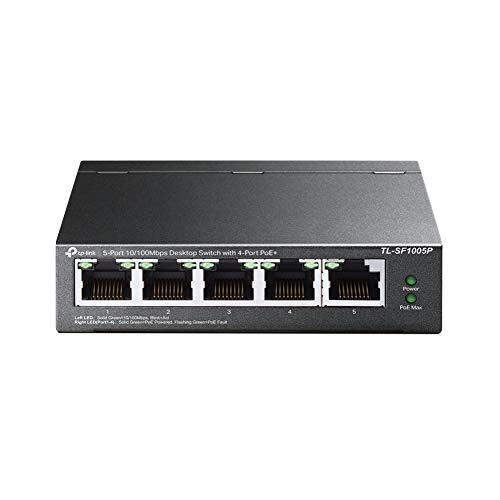
TP-Link PoE Switch 5-Port 100 Mbps, 4 PoE+ ports up to 30 W for each PoE port and 67 W for all PoE ports, Metal Casing, Plug and Play, Ideal for IP Surveillance and Access Point (TL-SF1005P)


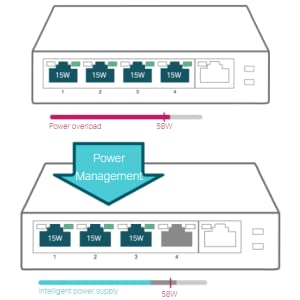
Intelligent Power Management
When total power consumption excels 58W, the intelligent power management will cut the lower priority port power off to ensure the high priority port’s power supply and protect the device from power overload operation.
Sturdy, compact metal casing and shielded RJ45 ports, with desktop/wall-mounting design, to meet your needs in any environment. Besides, the fanless design ensures quiet operation.
| Weight: | 240 g |
| Dimensions: | 9.98 x 9.8 x 2.5 cm; 240 Grams |
| Brand: | TP-Link |
| Model: | TL-SF1005P |
| Colour: | Black |
| Batteries Included: | No |
| Manufacture: | TP-Link |
| Dimensions: | 9.98 x 9.8 x 2.5 cm; 240 Grams |
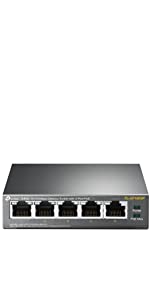
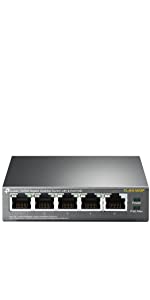
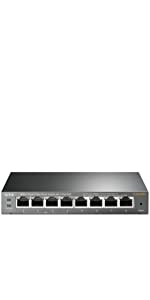
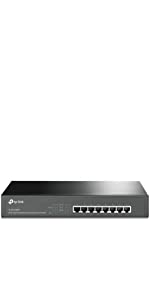
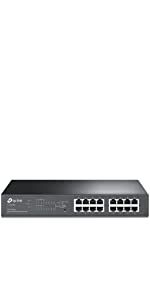
Hasn’t let me down so much that I forgot about it until I was doing some reviews on here.
Used regularly for our installations and competitively priced on Amazo
plug and play to get it to work. Clear instructions. But does get a bit hot when I’m using POE for 3 cameras only (4K Annke cameras)
Easy to use, just plug it in. I’m running a pair of VoIP phones off it, a Grandstream GXP2140 and a GXP2135. There are stick on feet in the box. It’s very light, so gets dragged around the shelf by the tension in the network cables. That’s solvable with Blu Tack. It’s also wall mountable. A very nice device.
Needed to power an Iris 450 camera.
It worked out of the box which is what i would expect from tp-link.
Had this powering my CCTV system for a few days now, very impressed for the price. It has a nice metal case rather than plastic, small size, doesn’t seem to be struggling at all powering the cameras, and nothing is getting hot. The plug and adapter stays cool, the unit itself stays cool, there’s no hum. For the kind of application I’m guessing this is likely to be used for (CCTV/wireless access points?), I think this is a really well thought out design. I’d be very comfortable fastening this away in a cupboard/loft/rafter somewhere, leaving it to do its job and forgetting about it – which is perfect.
I’m not always TP-Link’s biggest fan (I found their Homeplus adapters very unreliable). This however is just great. I had one POE cctv camera in my loft. That was on a combined Homeplug/POE adapter. When I added a second camera, I could have bought another Homeplug/POE adapter, but this seemed like a more elegant, extensible solution. I plugged in the two cameras to this hub and the hub to a Homeplug adapter. My NAS is just downstairs on a Homeplug adapter. Two HD cameras running permanently not a problem. I’ve had this hub for just over a year now. It has not missed a beat or needed a restart since I got it (just over a year). I’ve recently moved my router into the loft temporarily for testing of my broadband. That means that all my traffic between NAS and router is currently going through the hub alongside the IP cameras. Not an ideal permanent solution, but the hub has coped fine.
used to connect 4 cams to an NVR .. worked absolutely fine out of the box .. it wasn’t the cheapest (17 less for an equivalent), but suggested by a knowledgeable friend .. who said of the 6th port “it never does any harm to have a spare Ethernet port” .. for myself, I cannot conceive of ever needing that port, so have bought a 5-port equivalent (but also from TP-Link) for my second location ..
Built like a tank BUT you need to be aware that it uses the newer POE standard for ‘active’ connection. I spent a ‘happy’ hour or so finding this out and reading up what it means. It couldnt power my new access point (see another review) as it uses passive POE. Lots of nice facilities such as boost for long distances and port prioritisation. It can be used indirectly for passive POE devices if you chain it with a Ubiquiti converter. My AP now happy. Good product and great value for money.
This is a brilliant little switch, provided with a decent power supply, that adequately powers 4x PoE devices.
I’ve use them in various applications; from powering VoIP phones to CCTV cameras (which can have quite a high, and variable, power draw as a result of LED emitters being used etc) without any issue and it will happily handle reasonably steady 60Mbps streams of data.
Can’t beat it for the price really.
Reassuringly heavy weight for such a small box. Not so heavy that you could not put it where you like but it feels very sturdy. Plumbed into my network and works straight out box with zero fuss. Is now powering and connecting my IP camera.
I have several TP Link products and they have always been solid buys.
There is one port that is non-POE to be used as the uplink to your network, then it allows for up to 4 POE devices (CCTV cameras, Access points, etc).
No configuration is required just connect the uplink port to your router or existing ethernet network and then other four ports to your cameras.
I’ve been using them for well over 12 months and never had an issues or failures. Performance is good and adequate for most 5MP cameras.
No hesitation in recommending as long as your camera doesn’t demand more that 15.4 watts.
Good enough for running set of two security cameras. No setup needed so good choice for everyone. Mine is plugged to another TP-link switch downstairs and anything I plug to this one, gets instantly recognized by my network.
I personally would prefer the port LED’s on the other side of the device. That way I could mount it to a wall fex, have the wiring come from below and with a fast glance from the front I could see if somethings amiss. This would naturally require the power input from the port-side, but I recon this is market-tested design so can’t really argue with it 🙂
(Mine is still unmounted as the full-house cabling drained my energy)
I now have several POE Powered IP based Security Cameras linked into my alarm system, no need for separate power supplies to the cameras.
This adaptor is installed in a waterproof box in the roof space and linked to the outside cameras, it just needed a power supply mounted in the same box and 1 Ethernet link over to the Video Recording/Security console.
To be on the safe side I used external grade Ethernet cable, it’s tougher and I know that damp conditions are not going to affect it.